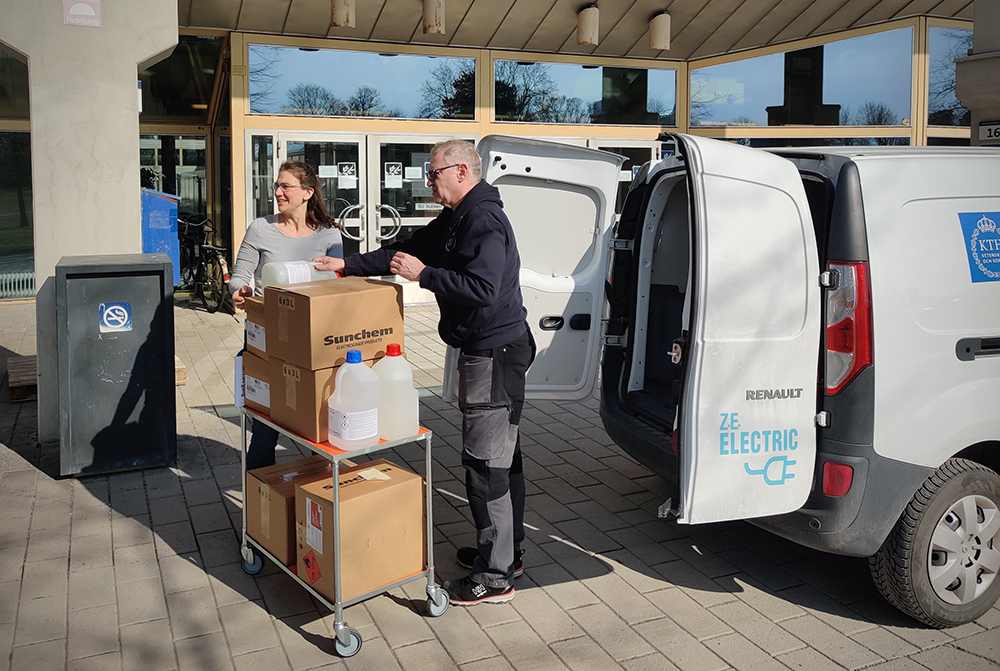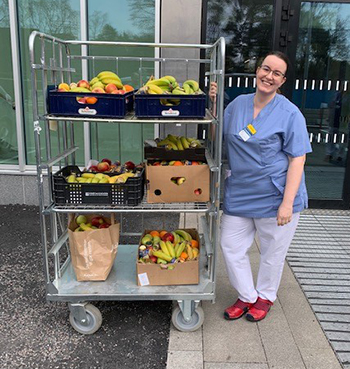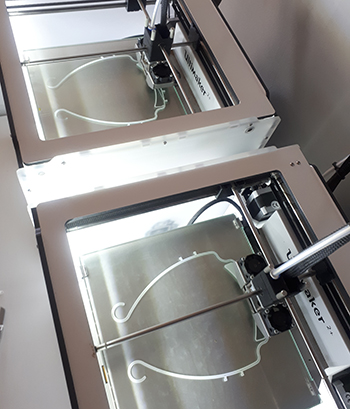
People want to help in a crisis
The coronavirus crisis is having a huge impact – and people are keen to help. The healthcare sector alarm about failings has persuaded employees at KTH to launch various initiatives. These initiatives are now being coordinated to make them more effective.
The coronavirus crisis is having a huge impact – and people are keen to help. The healthcare sector alarm about failings has persuaded employees at KTH to launch various initiatives. These initiatives are now being coordinated to make them more effective.
In times of virus outbreaks and major stresses on society, many people want to do their bit to help. When Patrick Janus , a doctoral student at the School of Electrical Engineering and Computer Science, heard that the healthcare sector was being brought to its knees, he didn’t think twice about trying to do something.
He is one of the contact persons in the new organisation that KTH has put together to coordinate help and support for healthcare providers.
“It’s in my very marrow as a former boy scout to help when society needs it. My wife also works in the care sector and I know how chaotic the situation is in many places with a desperate shortage of materials and protective equipment.”
Janus has led efforts to collect and deliver isopropanol, a chemical used in the production of hand sanitiser. The Chemistry Section at Stockholm University has been producing hand sanitiser for some time, but has gradually been running out of the ingredients.
“We’ve emptied all the stock we had in three departments, 150 litres in total, that we’ve decanted into containers and rushed them to the university.”
Ready-made hand sanitiser
With the addition of a few litres of glycerol that has also arrived with the help of staff at the School of Electrical Engineering and Computer Science service department, the chemicals will be enough to make 1,500 litres of hand sanitiser. The KTH School of Engineering Sciences in Chemistry, Biotechnology and Health have also provided over 40 kg of glycerol.

“We have also now been licensed to manufacture hand sanitiser using another chemical, butanol. Things look a bit bleak here, but we are trying to find other people who can help. We have developed contacts and procedures and can deliver very quickly, if needed,” says Janus.
Christina Zander , Head of Administration at the School of Electrical Engineering and Computer Science, is responsible for coordination with healthcare providers.
“There’s such a tremendous sense of involvement at KTH and a great many people want to help out. I get emails and inquiries all the time. We’re now trying to ensure production that is as safe as possible and then deliver this help.”
Healthcare priorities
Zander in in direct contact with both the City of Stockholm and Region Stockholm to gain a better picture of what is needed where in the care sector and what to prioritise.
“The fact is they are better able to assess the situation and allocate products to where they are needed most. They understand the logistics and can help us increase production volumes and become more efficient.”
KTH Post is also included in this coordination work and their staff can despatch packages with protective materials for onward delivery, for instance.

The need for face shields and OH film in healthcare has led to feverish activity among researchers and employees at KTH. “For the past week, the 3D printers have been running hot at the House of Science,” says Anders Blomqvist , Head of Development for the Chemistry Group.
Communication via social media
Last week, over 100 face shields were sent to hospitals via a partnership with 3D-verkstaden, a company that specialises in 3D technologies, that also supplies approved drawings for face shields. Blomqvist has another 50 face shield headbands waiting for delivery.
“We are now going to become part of the KTH aid organisation and KTH Post to ensure more efficient and secure delivery. This also makes it easier to get feedback on what they are asking for in healthcare. We are also thinking about contacting KTH Makerspace to join forces, where their 3D printers can run 24/7.”
Anna Eklund , Head of Department at the School of Architecture, is working flat out to produce face shields for care personnel at risk of droplet infection. The first shipment of 100 masks was despatched a couple of evenings ago to a care home in Alsike and a clinic in Uppsala.
“People are learning about the work we are doing via social media and we were asked directly if we could help,” says Eklund, who is managing production in quarantine at home.
“It feels good to be able to do something practical in a situation where you otherwise feels so powerless. We will continue production for as long as there’s a need and we are able to source printing materials.”
Text: Christer Gummeson

